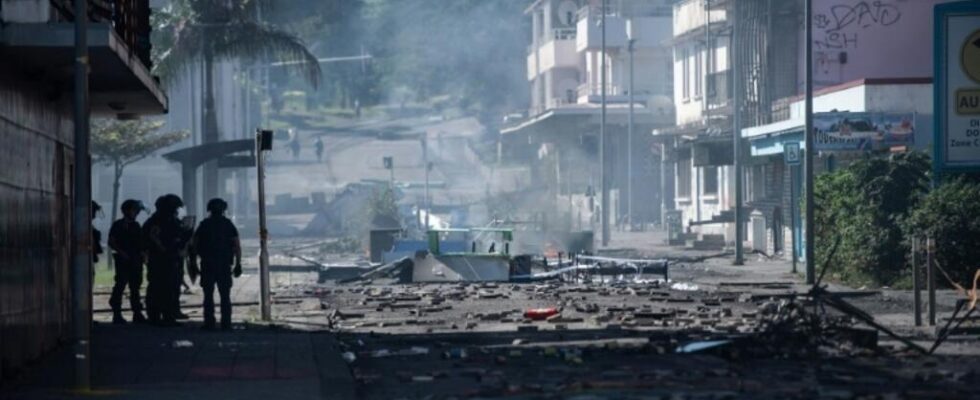The Noumea Court of Appeal has rejected the requests for release of five independence activists accused of playing a role in the recent riots on the archipelago, including the leader of the CCAT. However, the request was accepted for two of the accused, who were placed under house arrest in mainland France for six months.
2 min
The Court of Appeal ordered on Friday July 5 the release under judicial supervision of Frédérique Muliava, the chief of staff of the president of the Congress of New Caledonia, and Brenda Wanabo, communications officer of the CCAT.
Me Calmet can’t believe it, the Noumea Court of Appeal has just ordered the release of his client. Incarcerated in mainland France, 17,000 kilometres from home, at the same time as eight other independence activists, the young woman is placed under judicial supervision with another activist. The two women were placed under electronic surveillance in mainland France as part of a six-month house arrest with a number of obligations, including a ban on contact and a ban on discussing the case in the press. explains Me Calmet to our correspondent in Noumea, Charlotte Mannevy. For us, that was the fight we were leading, explaining that the detention, particularly of Mrs. Wanabo, was not justified and that she should be placed under an electronic tag. These people never called for violence; that Brenda is placed under an electronic tag is a first victory and we can only be happy about it. »
Continue the procedure before the high courts
Five other activists had their appeals rejected. Among them, Christian Teinleader of the CCAT, who the courts accuse of having organized the violence in New Caledoniawhich caused nine deaths and 2 billion euros of damage, and who therefore remains in detention in Mulhouse.
Four other appeals examined on Friday were rejected by the appeal court in Noumea, the capital of the archipelago, including those of Joël Tjibaou, son of the independence leader Jean-Marie Tjibaou assassinated in 1989, detained in Noumea, and of Dimitri Tein Qeneigei, nephew of Christian Tein, detained in mainland France.
Their lawyers, including Mr François Roux, have already appealed to the Court of Cassation: “ I wouldn’t say it’s a surprise. We’re taking note. But in the immediate future, what seems important to me is to continue the procedure before the highest courts, first the Court of Cassation. And then, as I said when pleading, it will be the European Court of Human Rights. »
Mulhouse, Villefranche, Bourges and Nevers: the activists were dispersed to the four corners of France after their transfer on board a plane specially chartered on June 23A transfer which led to a resumption of clashes and which seriously complicates their defense, according to their lawyers.
In the archipelago, the bill for the riots has risen to 2.2 billion euros
At least 2.2 billion euros is the cost of the riots that occurred in New Caledonia, following an electoral reform rejected by the separatists. The archipelago has been in the grip of violent unrest since May 13, born of the contestation of a bill modifying the electoral criteria for the New Caledonian provincial elections, which would have had the consequence, according to its opponents, of marginalizing the weight of the indigenous Kanak people.
The events left nine dead, including two police officers, and caused immense damage. The latest assessment by the local government, dated 22 June, estimated the cost of the crisis at 1.2 billion euros for the private sector, and an additional 1 billion for public infrastructure.
According to a local government document, some 700 private businesses were burned, looted or vandalized. On the public side, nineteen schools went up in smoke, as well as several media libraries, technical premises or offices, for a total cost of 385.3 million euros.
To date, New Caledonia has already benefited from more than 250 million euros in public aid, the High Commissioner of the Republic announced on July 2, ” or more than the financial support that the State pays to local authorities each year ” of the territory. ” There is enough to last until the end of August “, says Yannick Slamet, in charge of the budget at the local government. From September, we have no means of paying civil servants “, he emphasizes.
The archipelago is already heavily indebted: a payment of 50 million euros, allocated to the territory’s budget on Thursday, has already caused its debt rate to rise to 180%. The assessment of the damage is still far from being final. After a mining site on Tuesday, a school on Thursday, it was a sports hall that was set on fire this Friday, July 5.
Read alsoNew Caledonia: two separatists imprisoned in Noumea amid renewed violence
